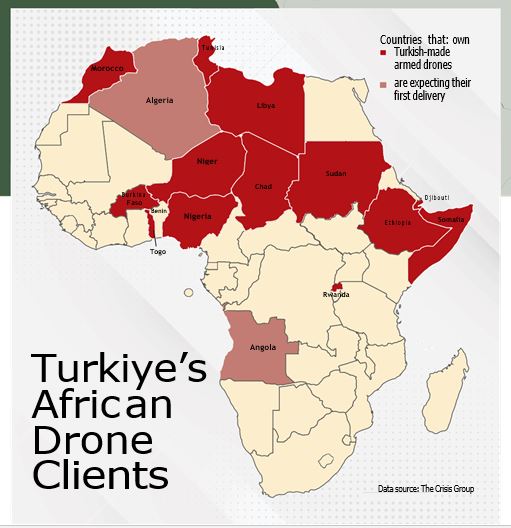In early June 2024, several Middle Eastern and Western media outlets reported that Turkiye is deploying fighters from the Turkish-controlled Free Syrian Army to various countries in the Sahel, including Nigeria.
This corroborates SBM Intelligence’s monitoring since December 2023, when rumours first emerged on Telegram. On 28 December 2023, it was reported that Turkiye sent the first batch of Syrian National Army (SNA) militants to Niger. The initial group consisted of the Sultan Murad Division, followed by the Second Corps. These militants underwent light training from the Turkish military before deployment.

SBM Intelligence understands that these deployments to Burkina Faso, Niger, Nigeria, and Togo are ostensibly for guarding Turkish-operated businesses like factories and mines. However, the nature of the deployment has raised concerns about regional security and the approval process.
Turkish opposition parties claim that SADAT, a controversial private Turkish military company led by a former Turkish presidential adviser, recruits these fighters for covert state operations. SADAT, founded by ex-general Adnan Tanriverdi, is viewed as President Erdogan’s parallel army and has previously played a significant role in Libya.
Sources indicate that the decision to send troops to Africa came from high levels within the Turkish government, though it is unclear if Erdogan is directly aware. A 2020 report by the United Nations Office for the High Commissioner for Human Rights revealed alarming human rights violations committed by the SNA, including the Sultan Murad Brigade, in Syria. These violations include pillage, destruction of property, and forced marriages.

While the deployments are reportedly for guard duties, some fighters in Niger have been involved in combat against Islamist groups. Since 2019, Turkiye has increased its presence in the Sahel, often conflicting with France, traditionally the region’s economic and security anchor.
Turkiye’s historical links with Africa, especially through religion, have facilitated its geopolitical influence. Investments in mines and education, along with the sale of Turkish drones, have further solidified Turkiye’s presence.
Turkish drones like the Bayraktar TB2 have become popular in Africa due to their performance and cost-effectiveness. Despite uncertainties about defence agreements between Sahelian juntas and Turkiye, the deployment of SADAT mercenaries introduces a new dynamic in Nigeria’s security landscape. While Nigerian authorities deny the presence of these fighters, their proximity via Niger and Togo poses regional security risks.
The involvement of state-backed entities primarily advancing their home state’s interests exacerbates the security situation in the Sahel. The pivot towards Ankara by some Sahelian states, such as Niger, has not necessarily improved security, pointing to a sovereignty crisis and diplomatic challenges for Nigeria and its neighbours.


